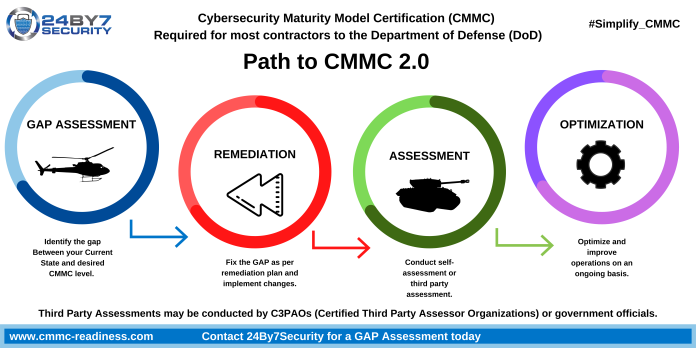Securing contracts with the Department of Defense (DoD) has always been highly competitive. With the DoD handling some of the most sensitive information and operations in the world, contractors must demonstrate their ability to protect this critical data. The Cybersecurity Maturity Model Certification (CMMC) is a key factor in ensuring contractors can meet the cybersecurity demands necessary to win and maintain these contracts. As cyber threats become more advanced, the need for strict cybersecurity protocols has never been greater, and the CMMC provides a structured framework that ensures defense contractors have robust systems in place.
CMMC compliance is now a mandatory requirement for any organization looking to work with the DoD. Whether a company is directly bidding for a contract or is part of a supply chain that touches sensitive information, achieving CMMC certification is essential for qualifying for these lucrative opportunities. The updated CMMC 2.0 model further streamlines the process but maintains the same rigorous focus on cybersecurity.
Why CMMC is Essential for DoD Contracts
The primary goal of the CMMC is to secure the DoD supply chain by establishing baseline cybersecurity practices for all contractors. Whether companies are handling Federal Contract Information (FCI) or Controlled Unclassified Information (CUI), they must meet specific CMMC requirements to participate in defense projects. Without CMMC certification, contractors will be ineligible to bid on or continue work on any DoD contracts, making it a non-negotiable element of business strategy for those in the defense sector.
Cyberattacks targeting the defense industrial base have increased in frequency and sophistication. The DoD has recognized that its contractors represent a potential vulnerability in its broader security efforts. The CMMC ensures that all contractors implement and maintain cybersecurity measures that protect sensitive information from these cyber threats. Companies that do not prioritize CMMC compliance are at a higher risk of cyber incidents, which could result in lost contracts, financial penalties, or reputational damage.
The Role of CMMC Levels in Contractor Eligibility
The CMMC framework is divided into three levels, each representing a different stage of cybersecurity maturity. The level of certification required depends on the sensitivity of the information being handled by the contractor. Understanding these levels and what they entail is crucial for determining how to approach the CMMC assessment process.
- Level 1: Designed for companies handling Federal Contract Information (FCI), Level 1 addresses basic cybersecurity hygiene. It includes 17 practices aimed at protecting FCI from unauthorized access. Contractors seeking this level of certification must demonstrate foundational security measures, such as implementing strong passwords and limiting data access.
- Level 2: This level is intended for contractors managing Controlled Unclassified Information (CUI). It incorporates practices aligned with the NIST SP 800-171 framework and introduces more advanced cybersecurity measures. Level 2 requires contractors to demonstrate their ability to detect, respond to, and recover from cybersecurity incidents, ensuring the protection of CUI from more sophisticated threats.
- Level 3: Reserved for contractors handling the most sensitive information, Level 3 requires a comprehensive approach to cybersecurity. Companies must implement advanced security measures, such as continuous monitoring, risk management, and incident response planning. Contractors seeking Level 3 certification are responsible for protecting high-value assets and must demonstrate their ability to defend against persistent threats.
Understanding which CMMC level applies to a business is critical for ensuring compliance and winning DoD contracts. A CMMC consultant can provide expert guidance on which level is required based on the types of information handled and the scope of the contract. For many contractors, particularly those dealing with CUI, higher levels of certification will be required.
The CMMC Assessment Process
Achieving CMMC certification requires passing a formal CMMC assessment, which evaluates an organization’s cybersecurity practices against the CMMC requirements for their desired level of certification. The assessment is carried out by a certified third-party assessment organization (C3PAO) and is a critical step in becoming eligible to bid on DoD contracts.
Preparing for the CMMC assessment involves a comprehensive review of an organization’s existing cybersecurity practices, policies, and technical controls. Contractors must be able to demonstrate that they have implemented all required security measures for their certification level and that these controls are functioning effectively.
A CMMC consultant can play an important role in helping organizations prepare for the assessment. By conducting a pre-assessment review, the consultant can identify gaps in the contractor’s cybersecurity posture and provide recommendations for improvement. This ensures that contractors are fully prepared for the formal CMMC assessment and reduces the risk of delays or failures in the certification process.
CMMC Compliance as a Competitive Advantage
Achieving CMMC compliance is more than just a requirement for doing business with the DoD—it can also provide contractors with a significant competitive advantage. With CMMC certification, contractors can demonstrate their commitment to cybersecurity, differentiating themselves from competitors who may not have invested in the necessary protections. In an environment where cyber threats are constantly evolving, having CMMC certification provides assurance to the DoD that the contractor takes data security seriously.
For companies working in the defense sector, CMMC compliance opens the door to larger and more complex contracts. As the DoD continues to expand its cybersecurity requirements, contractors that have already achieved certification will be well-positioned to take on new opportunities. Those who delay in achieving certification may find themselves at a disadvantage, especially as CMMC becomes an increasingly important factor in the bidding process.
Additionally, companies that achieve higher CMMC levels, such as Level 2 or Level 3, can bid on contracts that require the handling of CUI or more sensitive information. This allows them to work on more critical projects, which often come with higher payouts and longer-term contracts.
Key Benefits of CMMC for Contractors
The implementation of CMMC provides several key benefits for contractors, particularly those looking to build long-term relationships with the DoD:
- Increased Eligibility: CMMC certification is a requirement for bidding on DoD contracts, meaning companies without certification are automatically disqualified from many opportunities. Achieving compliance opens the door to a wide range of defense contracts.
- Enhanced Security Posture: By implementing the cybersecurity practices required by CMMC, contractors significantly reduce their risk of falling victim to a cyberattack, protecting sensitive data and ensuring business continuity.
- Greater Trust from the DoD: CMMC certification demonstrates to the DoD that a contractor is serious about cybersecurity, increasing trust and building a strong working relationship with government agencies.
- Expanded Business Opportunities: With CMMC certification, contractors can pursue more complex and higher-paying contracts, especially those that require handling sensitive information like CUI.
- Improved Competitive Position: Contractors with CMMC certification can stand out from competitors who may not have achieved compliance, providing a distinct advantage in the crowded defense contracting space.
CMMC is not just a requirement for doing business with the DoD—it is a strategic tool for ensuring that contractors are prepared to handle the cybersecurity challenges of the modern defense environment. By achieving CMMC certification, contractors can unlock new opportunities, protect sensitive data, and strengthen their position in the defense sector







